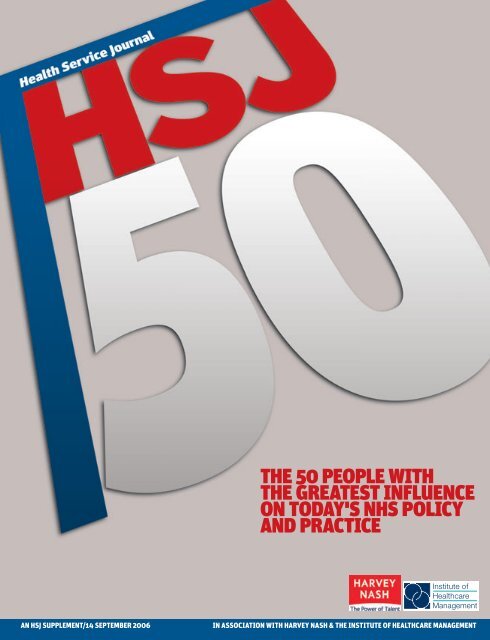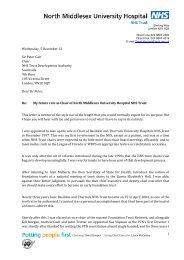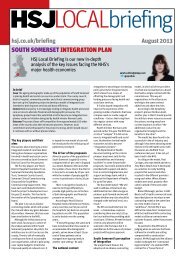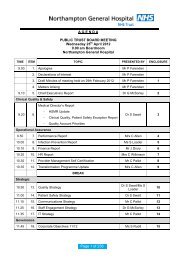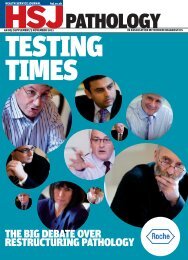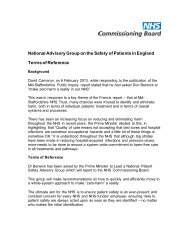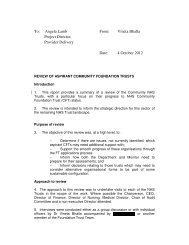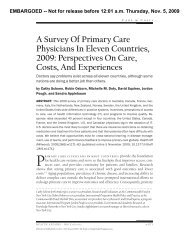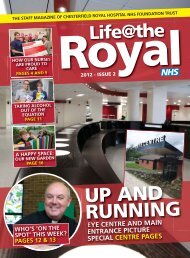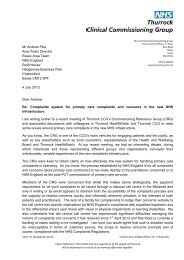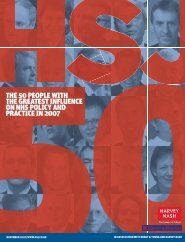HSJ50 2006 supplement - Health Service Journal
HSJ50 2006 supplement - Health Service Journal
HSJ50 2006 supplement - Health Service Journal
You also want an ePaper? Increase the reach of your titles
YUMPU automatically turns print PDFs into web optimized ePapers that Google loves.
NICK DAWE, ED MAYNARDDAVID NICHOLSONNHS CHIEFEXECUTIVE3Why is the man in charge ofthe NHS not at the top ofthis list? First: the plainspeakingNottinghamnative has only just takenup post. Second, how much powercan even the most senior managerhave in a world of politics? Well, let’slook at his form.Mr Nicholson is an NHS veteran.He has worked in mental healthtrusts, learning disabilities, acutetrusts, and, depending on how youcount it, he has run six differentbodies at interim level.As chief executive of Birminghamand the Black Country strategichealth authority from 2003 untilthis July, he stole a march on policy,introducing a fitness for purposestyleregime for primary care trusts.By July last year, the SHA wasclaiming some of the lowest waitingtimes in England. Mr Nicholson hasadmitted to harnessing a ‘fierce,competitive’ spirit to achieve that, bycomparing figures to those of Dorsetand Somerset SHA, where then chiefexecutive Sir Ian Carruthers wasseen as setting ‘a gold standard’.Before he took the reins of NHSLondon earlier this year he had beengiven two more West MidlandsSHAs to run.He has played a significant part inpolicy-making and implementation.He delivered the human resourcespolicy for the 2002 reorganisation ofthe NHS so well that he was asked toSIR LIAM DONALDSONCHIEF MEDICAL OFFICER4As the most senior medicin the country, Sir LiamDonaldson has been ‘thenation’s doctor’ since 1998.His influence penetrates‘By July lastyear his SHAwas claimingsome of thelowest waitingtimes inEngland’deep into Downing Street.The list of reports bearing hisname is long. He published the firstproper health protection strategybefore the creation of the <strong>Health</strong>do it again, though he handed thetask over when his West Midlandsempire expanded. He is admired forhis straight talking: comparing thehuman resources process for thisreorganisation with the last one hesaid: ‘Doing an HR process for areduction is much more difficult thanfor an expansion, it’s as simple asthat. Last time we were creating lotsof chief exec jobs, this time we’re not.’Apart from being appointed torun three SHAs, the biggestindication of the regard in which MrNicholson was held came in January2004, when he was asked to chair aProtection Agency. His report onpatient safety, An Organisation witha Memory, was similarly influentialin setting up the National PatientSafety Agency (his loss of patiencewas a major reason for its currenttroubles).Sir Liam was also the architect ofclinical governance in the wake ofthe Bristol inquiry. Most recently,his report on medical regulationused strong words to describe theattitudes of managers, accusingmany of being more concerned withpennies than patients.Colleagues adore the energy withwhich he pushes the causes close tohis heart, notably patient safety andhealth inequalities. They are causesbrought to the forefront by hisannual report. His support forpublic health is also evidenced bythe protection the professionenjoyed during the reorganisationof primary care trusts.This support has also broughtcontroversy, such as his backing fornational leadership group coveringpayment by results, new contracts,foundation trusts and patientchoice, although no-one is claimingMr Nicholson solved all the reformills and got home in time for tea.Colleagues speak admiringly ofhis skills: political influence,honesty, leadership, intelligence,numeracy, and compassion all arise.But he is also seen by many as abit of a ‘heavy’: witness his firstweeks at NHS London, when alltrusts that delivered a surplus lastyear found themselves under ordersto do it again.a total ban on smoking in publicplaces when his political masterswere trying to take a more moderatestance. Last year he revealed to thehealth select committee that heconsidered resigning over it; thatthe stance was changed in hisfavour is telling.After working as a doctor inBirmingham and Leicester, he wasappointed regional medical officerand regional director of publichealth for the Northern Regional<strong>Health</strong> Authority in 1986. He wenton to hold teaching and researchposts at Leicester University wherehe also spent time in generalpractice. Eight years later hebecame director for the Northernand Yorkshire region.Knighted in 2002, he has chairedthe WHO’s World Alliance forPatient Safety since 2004.The future? Some see his tendencyto go public with issues as evidenceof a last hurrah before a post-Blairstep-down. But he may surprise.4 <strong>Health</strong> <strong>Service</strong> <strong>Journal</strong> <strong>supplement</strong> 14 September <strong>2006</strong> hsj.co.uk
LORD WARNERMINISTER OF STATE FOR REFORM5The longest-serving ministerin the current team, LordWarner is generally felt tohave performed head andshoulders above hiscolleagues since being appointed inJune 2003 – not difficult, perhaps, ifyou are up against Melanie Johnsonand Stephen Ladyman. This wasreflected in the promotion to hiscurrent number two position afterthe last election.He has had some tough briefs tocontend with, including the nationalIT programme, the independenttreatment centre programme,hospital-acquired infection and thereview of arm’s-length bodies.One of his first jobs as a juniorminister was to get the FoundationTrust Bill through the Lords. At thetime it looked like a deeply troubledpolicy, not helped by the recentresignation of the much admiredLord Hunt. In the end it passed,with Lord Warner ‘calm and patientamid the party froth’, according toHSJ political columnist MichaelWhite.Others note his ‘feisty’ and‘naturally combative’ style. He hasthe experience and political radarto know how to maximise hiseffectiveness, and a knack for actingand talking like a human being.More recent priorities includedthe review of regulation andregulatory bodies, its results muchdelayed from the turn of the year.hsj.co.ukHis experience of local government(and the fact he came very close tobecoming chair of the AuditCommission before James Strachan)play an important part.His current role puts him at thecentre of what the government istrying to do to the NHS – hence hishigh standing in this year’s <strong>HSJ50</strong>.He is the minister leading on SHAand PCT reconfigurations,commissioning, choice and paymentby results.He is also the main ministeriallever for the shifting relationshipsbetween primary and acute care,something that will almost certainlycall on his negotiating skills over thenext year.The same applies to thesometimes fraught, but increasinglyimportant relationship betweenlocal government overview andscrutiny committees. If a year oftough decisions about restructuringbegins to unravel at local level andin the press, Lord Warner is likely tobe sent in to quell any disorder. Itmay have been the prime ministerwho said managers could expectsupport from politicians, but it isthis politician who will beshouldering the load.In the past he has been chair ofthe Youth Justice Board for Englandand Wales and has had a long careerin social care (he was director ofSocial services for Kent countycouncil in the late 1980s).HUGH TAYLORACTING PERMANENT SECRETARY, DoH6There are no fireworksabout this job – most ofthe influence it exerts isbelow the surface, visibleonly to the closest ofobservers. But the avuncular andapproachable man who links theDepartment of <strong>Health</strong> to ministersand who is, ultimately, responsiblefor its fitness for purpose has anundeniable impact on strategy andits delivery.In a speech at the NHSConfederation conference in June,Hugh Taylor was frank about someof the failures in the Department of<strong>Health</strong>’s recent past. Speaking aboutthe handling of Commissioning aPatient-led NHS, he said: ‘We got itwrong and we’ve got to be honestabout it.’ He set the failure in starkcontrast to the kind of ‘good policymaking’ behind the national serviceframeworks.How much has this changed?The ‘cock-up’, as HSJ put it, aboutthe national tariff that resultedin its withdrawal was anotherembarrassment which immediatelypreceded former chief executiveSir Nigel Crisp’s departureand Mr Taylor’s promotion.Formerly DoH director of strategyand business development, he hadonly just been promoted to SirNigel’s deputy when Mr Taylor tookthe acting role in March alongsideSir Ian Carruthers (7). The splittingof the role at the time was sold astemporary, although Sir Nigelhimself told HSJ he thought the casefor combining the role had grownweaker over the past few years.Many agreed that, whatever thephilosophical case for a combinedrole, it was simply too big for oneindividual to cope with. Some,such as Conservative spokesmanAndrew Lansley (21), supported thesplit as a path towards greaterindependence from politicians.Mr Taylor’s rise to deputythis year, effectively running thedepartment, is seen as one resultof McKinsey’s review of DoHeffectiveness. His further promotionsuggests he retained the supportof ministers even as the credibilityof his boss Sir Nigel leaked away.A DoH long-server, he wasdirector of external and corporateaffairs before being promoted to runthe new corporate management anddevelopment group in 2003.Before that he was a seniormanager in the Prison <strong>Service</strong>,the Cabinet Office and was alsodirector for NHS workforcein the NHS Executive.The Department of <strong>Health</strong>originally said recruitment for apermanent secretary would beginonce a permanent chief executivewas named. It remains to be seenwho fills that post, how soon andwhether Mr Taylor continues toexert influence in another role.‘His promotionsuggests heretainedministers’support evenas Sir Nigel’scredibilityleaked away’14 September <strong>2006</strong> <strong>Health</strong> <strong>Service</strong> <strong>Journal</strong> <strong>supplement</strong> 5
PROFESSOR SIR IAN KENNEDYCHAIR, HEALTHCARE COMMISSION9For a man who turns 65today, Professor Sir IanKennedy shows few signsof flagging. For the pastfour years he has beenchair of the <strong>Health</strong>care Commission,an organisation created on the backof his landmark report into thetragic history of paediatric care inBristol.When he was appointed asshadow chair of the commission in2002, many of those who hadwatched him steer the BristolInquiry applauded the appointment,seeing him as a thorn in the side ofthe medical establishment.As far back as 1980, the formeracademic lawyer and founder of theCentre of Medical Law and Ethicshad delivered a series of BBC ReithLectures which accused medics ofallowing ‘a closed professionalgroup or coterie’ to have amonopoly on understanding issuessuch as regulation.One politician who had workedwith him closely remarked ‘he’s justthe sort of awkward bastard’needed. Others, noting his sensitivehandling of angry bereaved parents,took a different but equallyapproving view.But cracks in the neworganisation showed quickly. InApril 2003, just two months afterappointing Peter Homa as its chief10Mike Farrar’sinfluence wasperhaps most obviouswhen he was workingfor the Department of<strong>Health</strong> in 1998, attempting topersuade the British Medicalinspector, Sir Ian asked him to standdown, following differences abouthow the new body should becreated. It took seven months tofind a successor, Anna Walker (36),but Ms Walker has remained in postsince, though a number of othersenior figures have come and gone.In its annual report, published inJuly, the commission said that ‘overthe last year it had firmlyestablished itself as a regulator thatmeans business’ with theintroduction of a new system toMIKE FARRARCHIEF EXECUTIVE, NORTH WEST SHAAssociation’s GP committee tosupport primary care groups.Plus ça change. As chief executiveof North West strategic healthauthority, clinical engagement is topof his list.With 24 years working for theNHS under his belt, Mr Farrar puthis hat into the ring for the job ofNHS chief executive. Only 46, thismay not be his only bite at thecherry; given the six years he spentin Whitehall, he is also one of thefew NHS figures who couldconceivably be considered for theDoH permanent secretary job.Mr Farrar has his own ideas aboutwhat makes a person influential.Earlier this year he stressed to HSJthat leaders ‘can’t rely on positionalpower’; ‘personal power andcredibility’ were required too (newsanalysis, page 19, 29 June).His NHS career began in healthpromotion, moving to drug andalcohol services, then mental health. Ashift to the DoH came in 1994, whena six-month secondment lasted sixyears; a period in which he oversawthe creation of primary care groups,PCTs and personal medical services.replace star-ratings, several majorinvestigations and reviews of areaslike obesity and cleanliness.But some critics have questionedwhether the organisation was tooslow to get this far, while othershave questioned the direction of theinspection agenda. In particular, theFoundation Trust Network hastaken issue with the imposition ofdevelopmental standards onfoundation trusts, while thecommission itself has criticised theDepartment of <strong>Health</strong> for failing toconsult it before introducing awhole new raft of productivitymeasures for trusts.And when compared with hisprofile during the Bristol Inquiry,Sir Ian’s role as the public face of thecommission appears limited.Yet his empire looks set toexpand. Merger with theCommission for Social CareInspection is scheduled for 2008,while a much delayed widergovernment review on regulationseems increasingly likely to back SirIan’s arguments in favour of themega-body becoming the singleregulator on finance and quality.Watch Sir Ian setting out hisarguments in favour of a takeover ofsome of Monitor’s functions and itis clear why his oft-repeated claim −‘I am a bear of very little brain’ −fools no-one.In 2000 he went back to theservice, as chief executive of Teeshealth authority. Two years later hebecame chief executive of SouthYorkshire SHA. The area was widelyacclaimed, primarily because of itsstatus as a foundation community,but several PCTs saw their financesworsen over the same period. InJune 2005, Mr Farrar took over thefinancially troubled West YorkshireSHA, in the year prior to merger.While in Yorkshire, Mr Farrarran negotiations for the NHSConfederation to introduce a newGP contract. At the time plauditsflowed in; since then Mr Farrar hashad to defend ‘short-term’ problemswith the costings but insists thecontract is world leading.Perhaps what marks Mr Farrarout from some of his peers isemotional intelligence; he showsmore ease than most talking aboutthe human cost of the pressuresmanagers face. And yet he is quite ablokey bloke. Peter Kaye fans cancontemplate why some describe thedouble act of Mr Farrar and newNHS chief exec David Nicholson asthe ‘Max and Paddy’ of the NHS.SUSAN HODGETTSON WHO’S IN ANDWHO’S OUTAgreeing who are today’s mostinfluential people in the healthcaresector is a daunting task, one bound tocause headaches and court controversy.When HSJ approached the Institute of<strong>Health</strong>care Management to be part ofthe panel, the smart move might havebeen politely to decline. But the IHMdoes not duck a challenge and ourpresident Gerry McSorley was pleasedto play his part alongside fellowpanellists in coming up with the <strong>HSJ50</strong>.The factor uppermost in determiningwho should appear was contemporaryinfluence. We were not interested inpast glories or possible future keyplayers. So apart from Andrew Lansley,opposition health spokespeople areconspicuous by their absence. Those inthe driving seat, such as PatriciaHewitt, Lord Warner and Andy Burnham,were bound to win through. So, too, wasan individual such as Professor PaulCorrigan, who has Tony Blair’s ear.As expected, it was impossible not toinclude some of the mandarins at theDepartment of <strong>Health</strong>, and the line-upreflects the importance that itsdirectors are having over the lives ofthose working at the NHS coalface.Naturally, the IHM is pleased to seeacknowledged the role that some of thebest healthcare managers are having onthe NHS. We are encouraged to see thatso many of our longstanding membershave made it onto the list, too.The IHM roll of honour includes theincoming NHS chief executive DavidNicholson, and the man holding the fortsince Nigel Crisp’s departure, Sir IanCarruthers. Others are the NHSConfederation’s Dame Gill Morgan andDoH directors Andrew Cash, David Colin-Thomé and Duncan Selbie. Another ischief nursing officer Chris Beasley.A rounded list would be incomplete ifthe influence of those analysing healthpolicy was not credited. Nick Timmins ofthe Financial Times and the Daily Mail’sPaul Dacre regularly produce copythat influences ministerial thinking.Ex-journalists such as Tim Kelsey, nowof Dr Foster, and Niall Dickson of theKing’s Fund, continue to use theirinvestigative instincts to sway policy.A top 50 that did not acknowledgethe influence of the independent sectorwould also be incomplete. FormerNumber 10 insider Simon Stevens, ofUnited<strong>Health</strong> Europe, continues to be aforce in the land.Medical profession leaders are alsorightly listed, as is Unison’s KarenJennings alongside Kevin Barron, chairof the health select committee.The movers and shakers are saluted –but heated debate will doubtless ensue.Susan Hodgetts is chief executive of theInstitute of <strong>Health</strong>care Management.hsj.co.uk14 September <strong>2006</strong> <strong>Health</strong> <strong>Service</strong> <strong>Journal</strong> <strong>supplement</strong> 7
PETER SEARLE, ED MAYNARDBILL MOYESCHAIR, MONITOR11An outsider with an whole boards, and even to revoke aenthusiasm for ruffling foundation trust’s licence. Hisfeathers whentrenchant treatment of Bradford’snecessary, Bill Moyes erring foundation board at the endDR GILL MORGANCHIEF EXECUTIVE, NHS CONFEDERATIONhas one of the most powerful jobsoverseeing the new NHS world.Former director general of theBritish Retail Consortium, MrMoyes was given power over thefuture of foundations trusts, taskedwith setting up the regulatoryframework within which theyoperate and fixing the terms forauthorisation.As such his decisions over thepast year have shaped the futures ofmany organisations, and in manycases disappointed ambitious chiefexecutives. How they respond tothat challenge – and Mr Moyes hasbeen critical of DoH efforts to helpthem – will be a major factor in thefuture NHS landscape.As regulator Mr Moyes has drawnup a prudential borrowing code andsets a borrowing limit for eachfoundation trust he authorises. Hehas the power to sack managers andBill McCarthy wasbrought into the DoHlast year to add somemuch-needed coherenceto what many saw as a policy messleft by former health secretary JohnReid. He was, apparently, personallychosen by Patricia Hewitt (2).His arrival at the DoH was seen asa sign that chief executive Sir NigelCrisp’s reign was coming to an endwith the wane of fortunes of thegroup he brought in. It was also seenas evidence of Ms Hewitt’sunhappiness with the handling ofCommissioning a Patient-led NHS andthe rigour imposed in its creation.Originally joining as director offinancial system reform, he was madeof 2004 made sure everyone knewhe meant business.The results of the much-delayedregulatory review which began lastyear should indicate what groundhe has lost or gained relative toProfessor Sir Ian Kennedy’s (9)<strong>Health</strong>care Commission and theAudit Commission. He has beenvocal in the past about the need forMonitor to be the financial regulatorof the whole NHS.Mr Moyes previously worked forthe Bank of Scotland Group as headof infrastructure investment and setup a private finance initiative team.from 1990-94 he was director ofstrategic planning and performancemanagement for NHS Scotland. Hisprivate and public sector experienceand lack of overbearing ego hasseen him prove a successful andinfluential addition to the regulatoryworld.BILL McCARTHYDIRECTOR OF POLICY AND STRATEGY, DoH18 19acting director of policy and strategyin January. Mr McCarthy’s first bigmove was writing <strong>Health</strong> Reform inEngland: update and next steps,designed to bring together recentpolicy and set out the timetable forfurther publications through <strong>2006</strong>.MATTHEW SWINDELLSSPECIAL ADVISER TO THE HEALTH SECRETARY12Matthew Swindells wasappointed last June andalmost straight awaywas plunged into workon the Our <strong>Health</strong>, Our Care, OurSay white paper, which came out inJanuary and outlined the waygovernment wanted to move healthspending away from hospitals andtowards the community.He has also guided much of thesystem reform agenda, such as thecontroversial reconfiguration ofPCTs. But in the main he leaves it tocivil servants to deal with day-todayimplementation matters,preferring to look at how policyshould develop.He works closely with specialadviser Liz Kendall (34) and TonyBlair’s health policy adviser PaulCorrigan (1) and before him IanDodge (39).15The top job at the NHSConfederation alwayscarried influence butnot all chief executivescould claim to have the standing ofDr Gill Morgan. Like James Johnson(19), her counterpart at the BritishMedical Association, she has todefend her members without fallingout with government.Her many admirers praise herability to balance privatesteadfastness and public support,even when it does not make for aheroic headline. Her critics say theconfederation has been too soft onthe government. It is not a criticismshe has ever recognised – talking toHSJ when she took the job, she said:‘The question is, how do youinfluence people? Are you moreMr Swindell’s appointment aspolicy adviser came after two yearsas chief executive of Royal SurreyCounty Hospital trust. During histime there he managed to turnround the trust’s performance fromzero stars to two stars.influential pointing out their sinsor working alongside the policymakers?’The result: three years later shewas one of four people who newhealth secretary Patricia Hewittphoned on her first day in office.JAMES JOHNSONCHAIR, BRITISH MEDICAL ASSOCIATIONAlthough reappointedto the post for a furtheryear this June, JamesJohnson hasnonetheless faced criticism byBritish Medical Associationmembers for being too close to thegovernment.A motion held at the association’sannual conference attacked BMAleaders for not opposinggovernment plans to make the NHSmore market-driven and introducemore private sector involvement.However, he did succeed inpreventing the BMA becoming anaffiliate of pressure group Keep OurNHS Public, a move which wouldhave massively embarrassed it.Chair for the last three years, hehas overseen the implementation ofthe hard-won consultant contractand initiatives such as the Europeanworking-time directive and Hospitalat Night, which have reduced theworking hours of junior doctors.8 <strong>Health</strong> <strong>Service</strong> <strong>Journal</strong> <strong>supplement</strong> 14 September <strong>2006</strong> hsj.co.uk
KEN ANDERSONCOMMERCIAL DIRECTOR, DoH13In 2003 Ken Andersonwas appointed the firstcommercial directorgeneral in the history ofthe DoH — and a Texan to boot. Inthis role he has been tasked by thegovernment to procure privatehealthcare into the NHS. He joinedthe DoH a year earlier to head theprocurement of the first wave ofindependent treatment centres.Before joining the DoH he was inpost as director of healthcare at PFIcompany Amey plc and had been incharge of negotiating NHS privatefinance initiative contracts. MrAnderson has been instrumental insetting up the DoH’s supply chainexcellence programme in an attemptto charge the NHS with best practiceand value-for-money ideas onprocurement from the private sector.The relationship with the privatesector has become centre stage forboth the government and the NHSover the last two years and MrAnderson’s role has been pivotal.Sometimes uncomfortable withpublic speaking and shunningpublicity, his decisions will haveramifications for years to come.SIR JONATHAN MICHAELCHIEF EXECUTIVE, GUY’S AND ST THOMAS’14One of the few doctorswho has become a fulltimetrust chiefexecutive, Sir JonathanMichael has always been among themost influential managers sincetaking over at Birmingham 10 yearsago. Now running one of the biggestteaching hospitals in England, hisposition is assured. The onlyquestion is whether his ambitionlies beyond trust management.He was closely linked to the NHSchief executive job earlier in the yearalthough he was not one of the fournames on the final shortlist. Hisname has also been suggested as apossible contender to run the newLondon SHA.He has championed increasedinvestment in IT, shared servicesand more efficient use of surgicaltheatres. These are some of thereasons why his organisation hasmade a better transition tofoundation status than some otherbig acutes. Sir Jonathan also has thebenefit of good alumni at Guy’s –past colleagues include DoH actingdirector of communications Matt Teeand special ministerial adviserMatthew Swindells (12).NICOLAUS HENKEMcKINSEY GLOBAL HEALTHCARE16 17Nicolaus Henke’s highposition reflects theimpact that McKinseyhas had on the NHS inthe past couple of years. Thecompany has worked particularlyclosely with foundation trustregulator Monitor in establishingthe criteria for foundation statusand judging organisations’ chancesof achieving it. Mr Henke, leader ofthe company’s payor/providerpractice, has been a regular attendeeat Monitor board meetings.McKinsey’s work with Monitorconcluded that only half of acuteand mental health trusts would beready for foundation status by the2008 deadline, indicating manytrust boards were taken by surpriseby the vigour of the examination.McKinsey led last year’s review ofthe DoH structure: according to TheTimes, the DoH spent £1.27m withthe company for 2005-06, thoughthe report was considered toodamning for publication.ANDY BURNHAMHEALTH MINISTER, DoHAndy Burnham enteredthe mainstream healthworld in May this yearwhen the post-electionreshuffle saw him arrive as healthminister for delivery and quality,with an explicit brief from TonyBlair to charm.The 36-year-old has a workingclass background but a Cambridgeeducation. An MP since 2001, hewas a junior minister at the HomeOffice for a year, during which timehe saw his profile raised (not alwayspositively in the public eye) by IDcards and the Extradition Act.He has a ‘can do’ attitude,fronting the launch of the DoH’sstrategy to help the NHS achieve the18-week target. And he showedhow well suited his ‘HandyAndy’ moniker was when hestood in for Patricia Hewitt atCommons question time to make astatement on the long-awaitedmergers of PCTs and ambulanceservices.MARK BRITNELLCHIEF EXECUTIVE, SOUTH CENTRAL SHA20Mark Britnell hasmanaged the difficulttask of rising fast,talking loud andmaking friends – three things thatrarely go together for very long.He was made chief executive ofone of the country’s largest hospitaltrusts, University HospitalBirmingham foundation trust, atthe age of 34, having joined theboard as director of operations at28. Over the next five years heestablished a reputation forinnovation, clinical engagement,local power broking and a taste forpublicity. He also oversaw anenormous private finance initiativeto build a new hospital for the trustthat was finally signedoff earlier this year.It surprised veryfew people when hewas named chiefexecutive of one ofthe 10 new SHAsin the spring.With the longsufferingBedfordshire andHertfordshirehealthcommunitiesunder his belt, MrBritnell’s famousdynamism and focuswill be sorely needed.Originally an NHSmanagement trainee, MrBritnell has a knackfor astute careermoves. Theseinclude a year onthe civil service fasttrack and runningthe MiddlesexHospital’spioneeringdiagnostic andtreatment centre.He also sat on oneof the committeesworking on AlanMilburn’s NHSplan.While an acutetrust chief executivehe championed the use of clinicalinformation to drive improvementand innovative partnerships withthe independent sector. At the sametime he was one of the biggestenthusiasts for using foundationpowers to take over services fromfailing organisations in the acuteand primary care sectors.He was one of half a dozen NHSpeople to be regularly talked aboutas the successor to Sir Nigel Crisp asNHS chief executive. Many believe hewill be David Nicholson’s (3)eventual successor. Some think hehas suffered from the exit of SirNigel, his champion in the DoH –but that is to underestimate the firmfoundations of his reputation.hsj.co.uk14 September <strong>2006</strong> <strong>Health</strong> <strong>Service</strong> <strong>Journal</strong> <strong>supplement</strong> 9
ED MAYNARD, PETER SEARLE, ALEX MACNAUGHTON, MICHAEL AUSTEN, EMPICS/PA/IAN NICHOLSONANDREW LANSLEYSHADOW HEALTH SECRETARY21Among managers wellused to being malignedby opposition parties,Andrew Lansley isperhaps the most popular shadowhealth secretary for many years.Managers have been impressedwith the soft-spoken Conservative,who visited a fifth of English acutetrusts within a year of hisappointment in early 2004. Thosewho met him say he took time tolisten to concerns, and wereimpressed by his grasp of the issues.During his tenure he has had tofight voices in his party who wantedto see co-payment or socialinsurance systems in the NHS; andduring the last election he had topromote patient passports, a policydreamt up by his right-wingpredecessor Liam Fox, whichallowed Labour to paint theNIALL DICKSONCHIEF EXECUTIVE, KING’S FUND25Since Niall Dickson’sarrival from the BBC in2004, the King’s Fundhas focused heavily onissues such as long-term conditionsand choice, and funded the Wanlessreview of social care for the elderly.It has benefited from his liking forstirring up a debate.He is one of a small group of NHSfigures who health secretary PatriciaHewitt (2) regularly bounces ideasoff, and serves on the Cabinet Office’sNHS National Leadership Network.He is not afraid to speak out.While he said Sir Nigel Crisp wasright to shoulder responsibility forthe NHS’ hard times, he added thatthe timing of the former NHSchief ’s resignation was wrong andthat culpability extended to28Dr Mayur Lakhani,RCGP chair since 2004,started out with a lowerprofile than predecessorDavid Haslam, but this is changing.GP engagement, after the qualityand outcomes framework but beforepractice-based commissioning, wasa major challenge.He has warned GPs that failing toseize opportunities ‘could lead to adeclining GP profession pitchedagainst alternative providers with abusiness background’.One of Dr Lakhani’s key aims hasbeen to improve the image andstanding of general practice, fromone where GPs feel they are ‘lookeddown on’ by other medical areas.Conservatives as a party which didnot care about the NHS. He binnedthe policy straight after the election.Lansley says he plans to spendthe next two years talking to theNHS and the private sector for ideason how to take forward Conservativehealth policy.politicians who oversaw expensivepay deals that lay at the heart of somany financial problems.And in June he told HSJ thatpoliticians were ‘pretty useless’ indelivering health reform messages.DR MAYUR LAKHANIPRESIDENT, ROYAL COLLEGE OF GPSHe also wants to overhaulpostgraduate medical education andtraining for GPs, to drive up carestandards and prepare GPs for rolesand responsibilities previouslybelonging to secondary care.RICHARD GRANGERDIRECTOR GENERAL, CONNECTING FOR HEALTH22Richard Granger’sdebut as IT czar at theNHS Confederationconference was typical:he said the photographer could takeonly one photograph. When thehapless snapper took two, MrGranger sent him out of the room.His hard-nosed reputationpreceded him from his work withCapita introducing London’scongestion charge. The ITprogramme has also exhibited thattrenchant management of suppliers,although it has also had problems.The National Audit Office warnedthat its June report would criticiseConnecting for <strong>Health</strong>’s ‘failure totake the people in the NHS with thesystem’. The report turned out to bemild; its language and content saidto be the result of negotiation withMr Granger.26It is often said theunions are a spentpolitical force butUnison’s KarenJennings has shown that it is stillpossible for them to changegovernment policy.Ms Jennings is national secretaryfor health at the public sector union,where she leads the campaignagainst what she sees as the‘privatisation’ of the health service.She is in charge of the organisationof half a million health memberswho work across the broad range ofoccupations in the healthcare sector.Last year it was largely down toher campaigning that thegovernment backed down on plansto ensure PCTs handed over the vastmajority of the provision of theirservices to the private andvoluntary sectors.The proposal had beencontained in the infamousCommissioning a Patient-ledNHS document put out byformer NHS chiefexecutive Sir Nigel Crisplast summer.But Ms Jenningsgalvanised the unions tooppose the scheme and,following a high-profileLabour conference defeat, itwas announced that PCTs wouldonly have to divest services ifthey could not prove they coulddo it most cost effectively.And this summer shewas at it again, whenthe governmentpublished anadvertisementthat appeared toThe heat is now on. <strong>Health</strong>minister Lord Warner was forced toadmit earlier this year that CfHcosts would far exceed the £6.8bnallocated. The IT industry reckonseven a estimate of £12-18bn extra isconservative. And CfH’s clinicalengagement is still being criticised.KAREN JENNINGSNATIONAL SECRETARY FOR HEALTH, UNISONinvite bids from private firms to runclinical services. <strong>Health</strong> secretaryPatricia Hewitt (2) denied this, butshe still ordered the advert bewithdrawn and ‘redrafted’.Now Ms Jennings is a key forcebehind the joint union campaign‘The Heat is On’, which aims tohighlight the effect of governmentreforms on patient care.Issues on which she hascampaigned include privatisationand structural reform in the healthservice, health policy in older age,the ethics of industrial action,advocacy and empowerment ofhealth users, and whistleblowingand public interest disclosure.10 <strong>Health</strong> <strong>Service</strong> <strong>Journal</strong> <strong>supplement</strong> 14 September <strong>2006</strong> hsj.co.uk
PROFESSOR MIKE RICHARDSNATIONAL CANCER DIRECTOR23The cancer ‘czar’ is areassuringly resolutefigure, whoseunflustered response tothe NHS’s slight miss of the 95 percent target for 62-day urgenttreatment back in April seemed toreassure the prophets of doom.Professor Richards has describedhis growing sense of unease, beforetaking on the role, about the qualityof English cancer care. The 1999Eurocare 2 study found low survivalrates in England for many of themost common cancers and aLondon School of Hygiene andTropical Medicine/Office forNational Statistics study the sameyear found rates in England andWales were lower than in comparableEuropean neighbours.Tony Blair called ProfessorRichards to Number 10 and askedhim if the situation was as bad asthe figures suggested. ProfessorRichards was appointed cancerdirector in October 1999 and leddevelopment of the NHS cancer plan.Cancer networks have been key tothe significant improvements incancer care dating from that time.PROFESSOR SIR GEORGE ALBERTINATIONAL EMERGENCY ACCESS DIRECTOR27An outspoken advocateof clinical serviceredesign, Professor SirGeorge Alberti hasoverseen a transformation in bothA&E performance and ambulanceservices. A fierce defender of TonyBlair’s reforms, he continues to beone of the czars powerful enough tospeak his mind.He has called for a full-time NHSnurse for every residential care andnursing home for the elderly, to helpreduce the number of hospitaladmissions from private care homes.During his presidency at theRoyal College of Physicians Londonfrom 1997-2002, Professor Albertiadvised the DoH on how to ensurehigh standards of care whenimplementing new developments.29If primary care is thenew rock and roll for anNHS bringing servicescloser to home, is DavidColin-Thomé the new Elvis?His calm manner belies a shrewdbrain and ardent reform supporter.The innovative work of his Runcornpractice on measurement andmanagement of long-term conditionshas been influential in policy.Appointed in May 2001, Dr Colin-Thomé’s New Labour credentials areimpeccable. He welcomes practicebasedcommissioning havingeliminated the ‘personal profit’incentive. He is perceived in primarycare as a good listener and a goodbrain.Most recently he oversaw theinquiry into the ‘lethal mixture’ ofmanagement styles at PennineAcute Hospitals trust and has had astrong input into rethinking the roleof district general hospitals.DR DAVID COLIN-THOMENATIONAL PRIMARY CARE DIRECTORhsj.co.ukANDREW CASHDIR. GEN. OF PROVIDER DEVELOPMENT, DoH24As former chiefexecutive of SheffieldTeaching Hospitalsfoundation trust andchair of the Foundation TrustNetwork, Mr Cash’s role as theDoH’s first director of providerdevelopment is an indicator of thechanging landscape of relationshipsin the NHS.Even before he found his newdesk, his old partner at the network,Sue Slipman (47), called on him tourgently address Monitor’s claimthat less than half of trusts will beable to achieve foundation status bythe 2008 deadline.They face a cocktail of challenges,according to the regulator – apayment by results tariff thatpenalises rural trusts, unaffordableSIR GUS O’DONNELLCABINET SECRETARY30Cabinet secretary SirGus O’Donnell is thehighest-ranking civilservant in the BritishCivil <strong>Service</strong>. He is known forimpartiality, as well as telling thepublic administration selectcommittee that it is wrong for civilservants to publish memoirs.Sir Gus is also widely liked for hisdown-to-earth style of management,which includes working two days aweek in an open-plan office – thefirst Cabinet secretary to do this.As part of his mission to improvepublic services, Sir Gus has calledfor closer working between the civilservice and the voluntary andcommunity sector.PFI schemes and deficits that aren’tfalling nearly fast enough.In the spring, Mr Cash told HSJthat one of his first priorities was toestablish new systems to carrythrough controversialreconfigurations of local healthservices. He is also responsible forthe national turnaround teamprogramme, which can be fairlydescribed as having both fans andcritics among trust chief executives.Earlier this year his name couldbe heard being mentioned as acandidate for the NHS chiefexecutive, but was not on the finalshortlist. The DoH job is an openendedsecondment and he has saidhe will return to Sheffield by the endof next year. But secondments havea habit of not working like that.14 September <strong>2006</strong> <strong>Health</strong> <strong>Service</strong> <strong>Journal</strong> <strong>supplement</strong> 11
EMPICS/PA, REX FEATURES, ED MAYNARDSIMON STEVENSPRESIDENT, UNITEDHEALTH EUROPE31Barely into his 30s whenappointed then healthsecretary Frank Dobson’sspecial adviser in theearly days of the Labour government,Simon Stevens had alreadyestablished himself as one of theleading NHS managers of hisgeneration. Although later specialadviser to Alan Milburn during thecreation of the NHS plan in 2000, itwas as health adviser to prime32At press conferences,ministers and seniorofficials watch warilywhen a slim, bearded andbespectacled journalist raises hishand. This is Nicholas Timmins,whose question will cut straight to theeffects of their announcement – orpinpoint its weakness. They knowwhen they’ve been ‘Timmins-ed’. Yethe remains highly regarded by hissubjects – a tricky balancing act.33The paper’s MiddleEngland coalition ofsmall-c conservatives,professional women andaspirational ethnic groups reflects thepersonality of Paul Dacre, editor since1992. He once said: ‘If there are twowords that sum up the Mail’sphilosophy, they’re “aspiration” and“self-reliance”.’Dacre is no celebrity editor, usually34Liz Kendall’s recentviews have depicted thestate as the enabler ofpeople, indicating adesire to go beyond the nanny state.Choice, patient involvement and roleredesign for staff are her key themes.As lead researcher on health andsocial care at the Institute for PublicPolicy Research, Kendall was adviserto Harriet Harman (then social35A tall, energetic figure,Professor Rawlins’mixture of rock-solidacademic achievement,political nous and wit have beencrucial to NICE’s successful infancy asthe NHS’s rationing body. He has therare treble of support from ministers,the Department of <strong>Health</strong> and thepharmaceutical industry.The NHS’s current financialminister Tony Blair from 2001-04 thathe cemented his reputation.During his years at Number 10 hewas the intellectual engine behindincreasing the role of the independentsector in a bid to drive innovation andefficiency through additional capacity.He has been a powerful advocate ofNHS independence from centralgovernment, recently arguing in hisHSJ column for a service run in asimilar way to the BBC.NICHOLAS TIMMINSPUBLIC POLICY EDITOR, FINANCIAL TIMESPAUL DACREEDITOR-IN-CHIEF, DAILY MAILOften breaking key news, MrTimmins’ inclusion on this list is notmerely a reflection of the importanceof the Financial Times in a healthsystem which today must befinancially aware to a degreeimpossible to imagine a decade ago.His journalism makes the FT a mustreadfor directors and chief executives.Public policy editor since 1996, MrTimmins was previously a foundermember of the team which createdavoiding the limelight. Yet his oldschool,shouty personal style sets thetone for the Mail’s mix of editorialmoralising, hard news, celebritycoverage, health and women’s issues,with its disapproval of illegalimmigration, single parents andworking mothers.NHS bad news stories are fertileterritory, as are health scares – MRSA,MMR and vCJD ‘apocalypse’LIZ KENDALLSPECIAL ADVISER TO THE HEALTH SECRETARYsecurity secretary, and unofficialminister for women).She then went to the King’s Fundas fellow in public health, where someof her initiatives (including asuggested programme on publichealth for the London mayor)surprised academic colleagues whofelt it was ‘dumbing down’.Critics regard Ms Kendall as ‘not adetail person’. Yet they acknowledgeimbalance will make focus on NICEadvice even sharper at a time when ithas come under new pressure. Itsmethodology for assessments hasevolved in pragmatic partnership withthe pharmaceutical industry. ‘Risksharing’schemes (such as the onedeveloped for MS patients beingtreated with beta interferon) areleading the world in the assessment oftechnologies for health.His move to US healthcare providerUnited<strong>Health</strong> two years ago stirredcontroversy, although few healthservice figures are so widely liked andadmired.A regular on the conference circuit,he is well connected at the highestlevel. His direct influence has slippedin the past year as his vision hasturned away from the UK but hiscentral part in the Blair reforms of theNHS will have a lasting impact.The Independent. His understandingof health-adjacent topics is alsosignificant: his career has spannedscience and medicine, health services,social services, politics, labour andemployment.He is the author of the seminal TheFive Giants: a biography of the welfarestate (Harper Collins 2001), and thisyear wrote Designing the New NHS:ideas to make a supplier market inhealthcare work (King’s Fund).scenarios racked up thousands moreMail column inches than the eventualscientific rebuttals.Even ideological opponents respectthe Mail’s success: its circulationrising over recent years when mostdailies lost readership.Yet some observers wonder if theMail has peaked. The relaunchedtabloid Times is seen as making inroadsinto traditional Mail readership.her networking skills and politicalinstincts.At the IPPR she was a strongadvocate of creating new types ofpractitioner to <strong>supplement</strong> doctorsand nurses, and the patient-centredagenda. She warned that separatingdoctors’ pay from Agenda for Changecould create a problem for nursestaking on roles traditionally carriedout by doctors.PROFESSOR SIR MICHAEL RAWLINSCHAIR, NATIONAL INSTITUTE FOR HEALTH AND CLINICAL EXCELLENCESir Michael wants to strengthenother parts of NICE’s remit, such asits role in recommending thediscontinuation of outdatedtechnologies and treatments that are‘on the books’ of the NHS throughformularies or traditional practice. Hethinks NICE needs to recommendthat some things should be taken outof use, as well as introduced and,indeed, this is like to happen in future.12 <strong>Health</strong> <strong>Service</strong> <strong>Journal</strong> <strong>supplement</strong> 14 September <strong>2006</strong> hsj.co.uk
ANNA WALKERCHIEF EXECUTIVE, HEALTHCARE COMMISSION36As the quality regulator,the <strong>Health</strong>careCommission has anenormous role in thenew NHS market. Its chief executiveis a highly capable, dedicated anddetermined leader, working inpartnership with chair Professor SirIan Kennedy (9).Ms Walker was appointed chiefexecutive after disagreementsbetween Sir Ian and original chief37Bernie Ribeiro entered hispost as president of theRoyal College of Surgeonsof England with a bang.Just a month after taking up the post,he said that a tax-funded NHS isunsustainable and should be scrappedin favour of a social insurance system.Mr Ribeiro is a unique president inmany ways. He is the college’s firstblack president, he continues to workpart time as a surgeon and he wants38What patient power canachieve can be summedup with the name ofBarbara Clark. Ms Clarkis a Somerset nurse with breast cancerwho was prepared to sell her house toraise £27,000 for a year of the drugHerceptin.Ms Clark was denied the drug bySomerset Coast PCT. After a highprofilemedia campaign she raised39A career civil servant,Ian Dodge has nowreturned to the DoH,where he heads the newpolicy and strategy directorate. Forfive months in 2005, he was the primeminister’s shortest-lived specialadviser on health, treading in theheavy footsteps of Simon Stevens (31)and Professor Julian Le Grand.His period at Number 10 coincidedPROFESSOR CHRISTINE BEASLEYCHIEF NURSING OFFICER40Professor ChristineBeasley began workingtowards cleanerhospitals on herappointment in 2004, which coincidedwith the unveiling of A Matron’sCharter: an action plan for cleanerhospitals, which laid the responsibilityfor infection control on all NHS staff.As lead director for reducing healthassociatedinfections and the cleanerinspector Peter Homa, whichprompted his resignation. Colleaguesdescribe her as open, forceful andsometimes tough with top staff.However, the same staff still regardher management style asparticipatory. Other observersspeculate about creative tension in herprofessional relationship with Sir Ian,noting his academic background, and‘big picture’ vision.Horizon scanners are alreadyBERNIE RIBEIROPRESIDENT, ROYAL COLLEGE OF SURGEONSBARBARA CLARKPATIENT AND NURSEto be more politically engaged.His key priority at the college is toensure that surgeons are properlytrained to serve the community and toguarantee patient safety. Over the pastyear, he has been outspoken on thisand other issues.Mr Ribeiro says the government‘lost the plot’ on independenttreatment centres, and criticised it forfailing to consider the impact onsurgical training when they were first£25,000 towards the cost but, onappeal, an exceptional treatmentpanel found in her favour because ofher exceptional circumstances; MsClark is a single parent and fostercarer of a terminally ill child. She hadthreatened to take the case to theEuropean Court of Human Rights.The case fuelled a debate about theprescribing of Herceptin, which at thetime was unlicensed for use in the UK.IAN DODGEDIRECTOR, POLICY AND STRATEGY DIRECTORATE, DoHwith the furore over the launch ofCommissioning A Patient-Led NHS.The Financial Times saw his return toRichmond House as ‘a sign that theprime minister is deeply worried thatno-one in the DoH appears to keep afull grasp on the complexity of thegovernment’s health reforms’.They also quoted a Whitehallinsider on the need for ‘a politicaltake’ as well as a technical one, whichhospitals programme, she advocatedinfection-control training for NHSstaff to help fight MRSA and hospitalacquiredinfections. And she helpedadd Clostridium difficile to themandatory surveillance system to cutinfections.Many nurses are grateful forProfessor Beasley’s contribution tonurses now being permitted toprescribe from the full formulary.wondering what will happen after the<strong>Health</strong>care Commission’s proposedmerger with the Commission forSocial Care Inspection, scheduled forApril 2008. Others wonder how thecommission’s recent move to a selfinspection-basedsystem for trusts’assessment will be audited.The new system will clearly standor fall on whether the healthcommunity trusts in the honesty ofself-assessment declarations.proposed. He has asked Tony Blair toconsider exempting junior doctorsfrom the European working-timedirective, which he says will make italmost impossible for surgeons tocomplete their training satisfactorily.After the announcement of SirNigel Crisp’s departure from theNHS’s top job, Mr Ribeiro questionedthe practicality of the ‘enormous andrelentless change’ that is beingdictated by politicians.In a sense her influence goesbeyond a particular case or drug andis felt in what will be a definingdebate about rationing.Patricia Hewitt later ordered PCTsto consider granting use of the drug inindividual circumstances. Earlier thisyear it was reported that Ms Clark wasin remission, although she says sheknows she is not cured. Herceptin hassince been permitted for use by NICE.was deemed problematic for MrDodge, a civil servant, to provide.He was regarded by commentatorsas ‘joined at the brain’ with PatriciaHewitt’s special advisers Liz Kendall(34) and Matthew Swindells (12).A former head of primary carecontracting at the DoH, Mr Dodgealso held roles as a seniorperformance manager and head ofgeneral and personal medical services.Earlier this year she called on thegovernment to ringfence money fortraining and professionaldevelopment for nurse prescribers.Professor Beasley has looked at thetraining and skills needed by differentnurses, including a general review ofdistrict nursing education, and aframework outlining skills needed bycommunity matrons to help patientswith long-term conditions.hsj.co.uk14 September <strong>2006</strong> <strong>Health</strong> <strong>Service</strong> <strong>Journal</strong> <strong>supplement</strong> 13
ED MAYNARD, RALPH HODGSONNIGEL EDWARDSDIRECTOR OF POLICY, NHS CONFEDERATION41Not every influentialperson is a figurehead;some, like NigelEdwards, haveestablished themselves through thesheer quality of their contribution todebate. Mr Edwards’ job is toestablish the organisation’s positionon NHS policy in relation to members’best interests — as such, his ideasbear considerable weight.On Commissioning a Patient-ledTIM KELSEYCHIEF EXECUTIVE, DOCTOR FOSTER42The former SundayTimes news editor cofoundedhealthcareinformation providerDr Foster in 2000 – the idea originallyborn out of his own frustration as amember of the public when trying tocompare performance betweenhospitals. Since then he has proved atireless networker, co-opting some ofthe most influential figures inhealthcare in both social and formal43General <strong>Health</strong>careGroup chief executiveIan Smith hassucceeded insignificantly raising his profile inrecent months.His name appeared on the shortlistfor the job of NHS chief executive andalthough he was beaten by DavidNicholson (3), he is also largelycredited with steering General44Before his move to theAudit Commission inSeptember 2003 (afterhitting a glass ceilingin the DoH, some would speculate),Andy McKeon had been DoH directorof policy, responsible for the reformagenda, where his influence was seenacross target-setting (the old starratings,when the DoH was in charge),payment by results, patient choice and45Achieving a totalsmoking ban in publicplaces is perhaps themost notableachievement of Kevin Barron, whohas been Labour MP for Rother Valleysince 1983. He was dismayed when thehealth secretary accepted a bill withexemptions, but he reacted by tablingan amendment in January calling fora total ban, and removing exclusionsNHS his comment to HSJ thatforbidding PCTs from providingservices was ‘intellectuallyincoherent’ gave voice to what wasthen largely a silent protest againstthe most vilified policy announcementof recent years. It went on to lead theintroduction to the health selectcommittee’s damning report.Mr Edwards has also been criticalof the view that competitionnecessarily creates more innovativesettings. He was close to healthsecretary Alan Milburn in thecompany’s early days and can countSouth Central SHA chief executiveMark Britnell (20) among Dr Foster’snon-executives.The company was viewed withsome suspicion in the early days, andthe robustness of its data in its GoodHospital Guides was criticised.However, the quality of its products isnow generally well accepted.IAN SMITHCHIEF EXECUTIVE, GENERAL HEALTHCARE GROUP<strong>Health</strong>care through choppy watersand into a successful merger withSouth Africa-based private healthcareprovider Netcare.Mr Smith was originally appointedchief executive of General <strong>Health</strong>careGroup in September 2004 and sincethen has led a number of successfulbids into the DoH’s independenttreatment centre programme.Most recently he has helped toANDY McKEONMANAGING DIRECTOR OF HEALTH, AUDIT COMMISSIONintroducing private-sector provision.Audit Commission reports attractconsiderable political and mediainterest: they are seen as a very honestbroker. Recently, Mr McKeonintervened in the debate over deficits,arguing that the DoH should returnpart of the £504m 2005-06 overspenddeducted under resource accountingand budgeting (RAB). He compared itto ‘trying to treat a business as anKEVIN BARRONCHAIR, COMMONS HEALTH SELECT COMMITTEEfor private members’ clubs and pubsthat do not serve food. And he wasable to persuade the prime minister togive all Labour MPs a free vote.When a 200 majority voted for acomprehensive ban, Mr Barronclaimed it as an important stepchangein public health. He is alsoproud of his involvement in thepassage of a government bill to bantobacco advertising and promotion,practice. Indeed, his most consistenttheme is that a collection of policieswhich of themselves may be sensibleand workable have failed to cometogether to form a compellingnarrative. An infectiously enthusiasticconference speaker, Mr Edwards’intellectual curiosity is a huge serviceto the NHS, but a more ‘political’ rolemight be too much of a bind.● As a judge Nigel Edwards wasexcluded from deciding his inclusion.The company’s joint venture withthe DoH Information Centre forhealth and social care last year, toform Dr Foster Intelligence, marked amajor step forward for the company.It now has access to a powerful set ofpublic sector data which it hopes topackage for purchase by trusts. Thedeal was controversial enough toprompt a National Audit Officeinvestigation, expected to report laterthis year.secure preferred bidder status on twoof the seven national ITC diagnosticsschemes for Netcare and In<strong>Health</strong>.At the time of the merger withNetcare, Mr Smith said: ‘We are clearthat we have a significant role to playin supporting the government’spatient choice and quality agendas atvalue-for-money prices to the taxpayer.’Before joining the group, he waschief executive of logistics firm Exel.individual with a credit card bill’, andwarned of RAB’s ‘double whammy’effect, where obligation to generate acompensatory surplus in the mediumtermeffectively means losing moneyfrom budgets twice over. Mr McKeonsuggested that the system should bephased out this financial year, anddeductions repaid. It is an argumentmany would agree with, but will bedifficult to win.after he promoted a private member’sbill in 1993.Mr Barron was made chair of thehealth select committee after the 2005general election. His first major reportwas a blistering attack on primarycare trust configuration, whichcriticised the government for the lackof consultation. The committee alsolaunched an inquiry into the cause ofthe NHS’s financial troubles this spring.14 <strong>Health</strong> <strong>Service</strong> <strong>Journal</strong> <strong>supplement</strong> 14 September <strong>2006</strong> hsj.co.uk
RICHARD DOUGLASDIRECTOR OF FINANCE AND INVESTMENT, DoH46Among their manyself-confessed virtues,Yorkshiremen seethemselves assurvivors. By this yardstick, RichardDouglas is a nonpareil: still standingas DoH director of finance andinvestment, despite the departure ofalmost all the DoH’s old board, chiefexecutive Sir Nigel Crisp and NHSfinancial improvidence.His survival in the face of the47The Foundation TrustNetwork began life asan off-shoot of the NHSConfederation, a quietrelation to the much more vocalpresence of regulator Monitor.This year that has changed, withthe network increasingly to theforefront of representing foundationtrust interests – a shift in large partdown to the energy of director SueSlipman. When Tony Blair brought48Throughout the fastpacedreforms in thehealth service, NHSAppointmentsCommission chair Sir William Wellshas fought for clarity in the roles andresponsibilities of chairs and nonexecutives,whom he says will ultimatelycarry the can in the new NHS.Last year he publicly attacked thegovernment’s approach to49Mr Selbie inherits oneof the trickiestchallenges in NHSmanagement.Colleagues praise his ability toretain focus and to concentrate on theright things. Leading doctors speakhighly of him and he seems to be wellregarded by politicians of all colours.Mr Selbie joined the DoH inNovember 2003 as the director ofDR RICHARD HORTONEDITOR-IN-CHIEF, THE LANCET50Dr Richard Horton is aman who speaks hismind aboutcontroversial issues,regardless of how many feathers willbe ruffled.In 1998 he famously defended hisdecision to publish the controversialresearch by Dr Andrew Wakefield andcolleagues about the MMR jab andautism. He openly and repeatedlyfinancial and political fall-out speaksof a high level of indispensability, orperhaps a role as the organisation’smemory – a vital quality when tryingto resolve a financial mess such as theNHS’s current one.Appointed director of finance andinvestment in May 2001 (his secondstint at the DoH), his role was todevelop effective financial andinvestment support for the DoH.Going forward, Mr Douglas will needSUE SLIPMANDIRECTOR, FOUNDATION TRUST NETWORKtogether the network, Monitor,foundation trusts and FTSE 100companies earlier this year, it was MsSlipman who led the discussion. Asthe 2008 deadline for all trusts tobecome foundations approaches, herinfluence is sure to grow.Like Monitor’s Bill Moyes (11) sheis essentially an outsider. Beforejoining the network two years ago, shehad previously been chair of theFinancial Ombudsman <strong>Service</strong> andSIR WILLIAM WELLSCHAIR, NHS APPOINTMENTS COMMISSIONreorganising PCTs, saying theproposed reforms offered ‘no clarity’on the future for PCTs and NHSboards.His concerns were nailed downwhen the DoH forgot to send copies ofCommissioning a Patient-Led NHS toPCT chairs.Sir William dug his heels in andsaid he was not prepared to start onthe changes until there was moreDUNCAN SELBIEDIRECTOR GENERAL OF COMMISSIONING, DoHhsj.co.ukprogrammes and performance.During this time, he developed the‘Selbie Six’ priority areas for PCTs:health inequalities, cancer waitingtargets (31 and 62 days); the 18-weektarget; MRSA; sexual health and GUMservices; and patient choice andbooking. He is clearly able to handle afairly full plate.Like Richard Douglas (46), MrSelbie has survived his associationdefended professor Roy Meadow, thepaediatrician accused of givingmisleading evidence in the criminalproceedings against Sally Clark in1999, who was alleged to havemurdered her two sons.The verdict of serious professionalmisconduct given by the GeneralMedical Council against ProfessorMeadow was ‘unjust’, he said, andwould ‘profoundly damage the futureall of his undoubted shrewdness andexperience, as the top challenges forthe NHS are all financial: fromcommissioning to unbundling thetariff to payment by results to creatinga real NHS Bank.None of these are easy challenges:all involve pitfalls, risks and tacklingvested interests. Being seen to getthrough all of these successfullywould be an enormous – and verynoticeable – feather in his cap.before that worked at the CamelotGroup, the Gas Consumer Counciland the National Council for OneParent Families. Like a number of thehealth service’s most powerful figuresshe is a former communist as well as afounder member of the SocialDemocratic Party.Ms Slipman combines a direct stylewith sharp political nous. She willneed both to manage some fraughtrelationships between her membersclarification from the centre on theroles and responsibilities of boards.He was concerned about the successof the new PCT boards, which wouldbe central to any future judgements onthe quality of healthcare.Recruitment of non-executives hasbeen another crusade, as rapid policychanges, greater scrutiny onperformance and poor pay meantnon-executives were in short supply.with the Crisp era. The infamousMonth 10 finances letter (also knownas the ‘we know where you live’letter), which promised that ‘Sir Nigelis taking a close and personal interest’in trusts’ compliance with cuts wentout in Mr Selbie’s name. This surprisedinsiders, who say this letter wasintended to go out under Sir Nigel’sname. Whatever happened, Mr Selbiehas not been blamed by colleagues.of child protection services in Britain’.He criticised the GMC for sacrificingthe reputation of one person to saveits own hide, and called on thegovernment to urgently create a RoyalCommission to make recommendationsabout the use of experts by the courts.Away from controversy thedecisions he makes every week aboutwhat doctors read mean he has deepinfluence on their thinking. ●14 September <strong>2006</strong> <strong>Health</strong> <strong>Service</strong> <strong>Journal</strong> <strong>supplement</strong> 15
Nick Edwardsis editor of HSJ.Nigel Edwards is director ofpolicy at the NHS Confederation.Chris Hannah is former chief executive ofCheshire and Merseyside strategic health authority.Laura Donnelly isnews editor of HSJ.Robert Naylor is chief executive of UniversityCollege London Hospital foundation trust.Professor Ian Gilmore is the presidentof the Royal College of Physicians.Gerry McSorley is president of the Institute of<strong>Health</strong>care Management and director of theCentre for <strong>Health</strong> Improvement and Leadership.Alan Burns is the former chief executiveof Trent strategic health authority.Frank McKenna is head of NHS andhealth services practices at Harvey Nash.THE JUDGING PROCESSHow did we reach the top 50?How did HSJ come up with our listof the 50 people with the mostinfluence on today’s NHS? It was athree-stage process.First, we gathered suggestions fornames from more than hundred ofthe most experienced managers,academics, policy-makers andcommentators.This gave us a wide range ofcandidates for HSJ journalists todraw on for its longlist of about 80,in a very broad order.We then gathered together theCRITERIA● Everyone influentialin creating anddelivering healthcarepolicy was considered– they did not haveto work for the NHSitself. The onlyexclusions fromconsideration were theprime minister and thechancellor.● We consideredinfluence to be definedas: current rather thanhistorical; meaningmore than involvement,however heavy; andderiving from anindividual’scontribution rather thannecessarily their ‘jobtitle’.● We restricted themain list to those whoare consideredinfluential in theEnglish NHS. We felt theseparate nature ofdevolved healthservices meanscomparing influencebetween them does notmake sense.official judges for the <strong>HSJ50</strong> – whotook this longlist as their basis butwere free to debate, add and omit.And quite a debate it was, withdramatic late entries and‘relegations’. Not everyone agreedwith every choice but, in the end, wewere able to create a consensusaround the final list of 50 people.This list was kept a closelyguarded secret until the launch ofthe <strong>HSJ50</strong> at a special event at theTate Britain last night – and thepublication of this <strong>supplement</strong>. ●16 <strong>Health</strong> <strong>Service</strong> <strong>Journal</strong> <strong>supplement</strong> 14 September <strong>2006</strong> hsj.co.uk
HSJ.CO.UK


